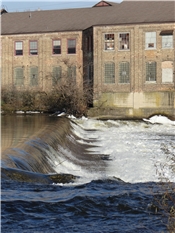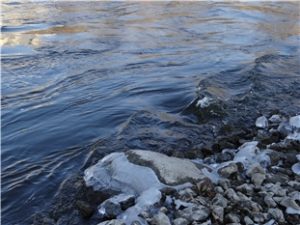A Strong Brown God
I do not know much about gods; but I think that the river
Is a strong brown god—sullen, untamed and intractable,
Patient to some degree, at first recognized as a frontier;
Useful, untrustworthy, as a conveyor of commerce;
Then only a problem confronting the builder of bridges.
The problem once solved, the brown god is almost forgotten
By the dwellers in cities—ever, however, implacable.
Keeping his seasons and rages, destroyer, reminder
Of what men choose to forget. Unhonoured, unpropitiated
By worshippers of the machine, but waiting, watching and waiting.
— excerpt, The Dry Salvages by T. S. Eliot
 Went for a short walk yesterday afternoon along the River Walk path in Batavia. The pathway is just a few feet from the waters edge, in full view of the old Challenge Company ruin on the opposite bank. The Fox River is not the Mississippi, but is a substantial body of water. I know that it would be difficult for a physically fit swimmer to cross to the other side especially when the water is high and running fast.
Went for a short walk yesterday afternoon along the River Walk path in Batavia. The pathway is just a few feet from the waters edge, in full view of the old Challenge Company ruin on the opposite bank. The Fox River is not the Mississippi, but is a substantial body of water. I know that it would be difficult for a physically fit swimmer to cross to the other side especially when the water is high and running fast.
 I walked down to the dam that served to power the Challenge Company machinery from the 1860’s until right after WWII when the successor company Batavia Metal Products ceased operations. The voice of the river, the sound of the water spilling over the dam was a undulating baritone. The water has been high for a few weeks due to the unusual amount of rain in the area and further to the north in the watershed that drains into the river.
I walked down to the dam that served to power the Challenge Company machinery from the 1860’s until right after WWII when the successor company Batavia Metal Products ceased operations. The voice of the river, the sound of the water spilling over the dam was a undulating baritone. The water has been high for a few weeks due to the unusual amount of rain in the area and further to the north in the watershed that drains into the river.
 A dam gives the river a voice. A man made obstacle that constricts the flow, directing the force of nature, energy which reached the earth as photons streaming from our sun, into human conceived purposes. The Challenge Company made windmills which aided in the settlement of the West. A farmer could pump water from a well to sustain animals, and for
A dam gives the river a voice. A man made obstacle that constricts the flow, directing the force of nature, energy which reached the earth as photons streaming from our sun, into human conceived purposes. The Challenge Company made windmills which aided in the settlement of the West. A farmer could pump water from a well to sustain animals, and for  irrigation needs on the homesteads of the west. The Batavia historical society records that by 1869, thirty or forty men were getting weekly pay envelopes at the Challenge pay window. The windmills were ultimately sold all over the world.
irrigation needs on the homesteads of the west. The Batavia historical society records that by 1869, thirty or forty men were getting weekly pay envelopes at the Challenge pay window. The windmills were ultimately sold all over the world.
I looked at a row of tall pilings on the opposite side of the river adjacent to the massive Challenge Company building and wondered what structure they must have supported. I would like to go inside the old factory to feel the presence of past generations who stood by the machinery so close by the river. I am sure they never forgot the river. I can imagine the giant drive shafts, belt driven machines suitable for fashioning iron and steel windmill parts.
The workers are gone, the bones of the old factory remain, for now. The river still sings by the dam, ever implacable, with a baritone voice.
I left for the public library to do some reading.